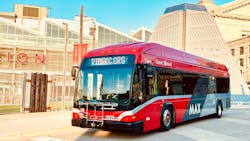The Ins and Outs of Special Event Service Planning: How Kansas City is Preparing for the FIFA World Cup 2026™
The main part of the FIFA World Cup is the competition on the field, but what happens if the fans from all around the world don’t show up because they lack reliable transportation? Kansas City, Mo., is working to ensure FIFA fans, tourists and the general public have reliable transit access for the FIFA World Cup games in 2026.
A look behind the scenes of this major event reveals a robust collaboration between Kansas City Area Transportation Authority (KCATA), the KC2026 Host Committee (KC2026) and local governments that has been years in the making.
Ahead of the game
According to KC2026 Director of Transportation Jason Sims, planning for the 2026 FIFA World Cup began in 2017 prior to receiving the bid. Planning really kicked into gear after Kansas City secured its bid in 2022. In the spring of 2023, Kansas City announced the creation of the host planning committee, KC2026. Within the host committee is the transportation work group, which meets monthly and includes representatives from the Kansas City International Airport, KCATA, Johnson County Transit, Kansas City Streetcar, the Mid-America Regional Council, the Missouri Department of Transportation, the Kansas Department of Transportation and the city.
The city registered KC2026 as a separate nonprofit to take on all planning responsibilities, with oversight from a board of directors. For an event this large, KC2026 recruited help to plan, maintain and operate transit services for the World Cup.
“We solicited an experienced transportation planning consultant team, including Burns & McDonnell, HNTB and Transportation Management Services (TMS), which we’ve been working alongside,” Sims said. “Our other high-level planning areas, which are in regular coordination with our transportation planning, include safety and security, sponsorships, marketing and communications, sustainability and regional impact.”
Transportation planning kicks into gear
Transportation planning was top of mind from almost the beginning. With VisitKC estimating 650,000 unique visitors—based on total visitor days during the event—to flood into the area throughout the tournament, the city took the initiative early on and became one of the first of the 16 World Cup hosts to secure a dedicated fleet of buses for the event. KC2026 signed a lease for 200 motorcoach buses on Feb. 28, 2025, putting the region ahead of the pack and ahead of schedule.
The motorcoach-style buses will each accommodate 50 seated passengers on average. Sims says the KC2026 bus system will work to complement existing bus routes on both sides of the state line, transporting the visitors to matches, the FIFA Fan Festival™, Kansas City International Airport, hotel centers and more.
Under the comprehensive and initial motor coach lease agreement, the contract covers the vehicles, fuel, maintenance and drivers for the duration of the World Cup. The private contractor will handle the day-to-day logistics of operating and maintaining the buses. This allows KCATA to focus on improving frequencies and span of service on its own select primary routes to help with additional ridership.
The bus lease was made possible through regional support, including funding from the states of Kansas and Missouri, Kansas City, Mo., and Johnson County, Kan.
Prioritizing shared mobility
On match days, World Cup fans will need to prepare their commuting plans in advance to ensure they’re on time and on schedule. According to KCATA COO Chuck Ferguson, the venue where the soccer matches will be played is east of the city and is about a 15- to 20-minute drive away from the downtown area, where visitors might be staying.
“People are not going to be able to drive to the matches,” Ferguson noted. “To watch the game, they're going to have to take one of the forms of transit, so people are going to have to get into the habit of not driving everywhere. We also expect there to be a significant amount of congestion around the fan festival site.”
Buses servicing the public during the games will be wrapped in FIFA World Cup 26™ branding and KC2026 Host City logos. Riders will be able to access bus schedules and real-time information through the free RideKC mobile app.
Another obstacle that might affect people's commutes to and from where the matches will be played is the decreased parking spaces available near the GEHA Field at Arrowhead Stadium.
“We love our cars here and so using public transit is going to be somewhat required because [the organizers] have taken the 20,000 parking spots at the football stadium where the matches are played, and they’ve scaled that down to about 3,000,” Ferguson said.
To offer another flexible mobility option, KC2026 will be running an independent park and ride system. Sims says the system will be designed to complement Kansas City's existing transit services, including the KC Streetcar's Main Street extension, which is anticipated to be operational in late 2025. Park and ride locations and additional details, such as days of operation, will be announced later this year. Sims adds KC2026 is looking into “options to incentivize people to plan early and take advantage of the tournament park and ride system.”
Addressing safety
As part of preparations for the World Cup, Kansas City is working to ensure rider and public safety as transit operations commence. Ferguson says KCATA is working with its partners to implement stronger security measures during the sporting event.
“We have assigned Kansas City police officers that are 100 percent dedicated to our system,” Ferguson noted. “They're not transit police, but they might as well be. They are wholly involved in our system. We have a contract with a local private security firm for up to 30 Class A armed private security guards.”
Ferguson adds that there might be a possible expansion of the current private security contract as the World Cup approaches.
Creating a lasting demand
According to Ferguson, KCATA operates a smaller transit service but is looking to flex its potential when the World Cup comes to town. KCATA will use this event as a way to grow its presence and improve its services. While preparing for an onslaught of tourists with different mobility needs is necessary, KCATA remains focused on its entire transit network. Ferguson explains riders will see expanded services outside the main World Cup areas, so visitors and residents can get to other popular and essential destinations.
“We are committed to not reducing any regular service—only expanding regular service,” Ferguson said. “While we do want to meet the expected demands of the fan festival, for example, we also want to expand services elsewhere because...we want to provide visitors, as well as residents, that same access that they have today, that they enjoy today and maybe some additional access.”
Ferguson shares KCATA is excited to offer a higher level of service in hopes of creating a lasting demand that garners more support for public transit initiatives.
“Maybe some services that we don't offer today...creates a demand and we have somewhat of a legacy when the World Cup is over—that people can say, ‘Hey, I really like that additional level of transit service’ and then they might support something new that we can develop,” Ferguson concluded.
About the Author
Eman Abu-Khaled
Associate Editor
Eman Abu-Khaled is a former associate editor with Mass Transit magazine.

